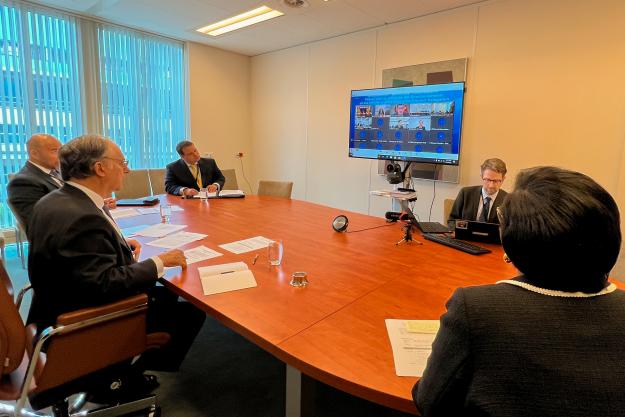
THE HAGUE, Netherlands—19 September 2022—A high-level delegation representing the Executive Council of the Organisation for the Prohibition of Chemical Weapons (OPCW), and the Organisation’s Director-General Ambassador Fernando Arias, paid a virtual visit to the Haerbaling (China) destruction facility on 15 September to assess the status of efforts to destroy chemical weapons abandoned by Japan on the territory of China.
During the virtual visit, the delegation received briefings from Chinese and Japanese officials on the progress made in the destruction of abandoned chemical weapons (ACW) in China. To date, an estimated 89,836 items of ACW have been declared on the territory of China at more than 90 locations. Of the nearly 90,000 abandoned chemical weapons in China, 60,170 had been destroyed as of June 2022.
The delegation, led by H.E. Ambassador Ziad M.D. Al Atiyah, Chairperson of the OPCW Executive Council and Permanent Representative of the Kingdom of Saudi Arabia to the OPCW, received a virtual tour of the Haerbaling destruction facility, located in the Jilin Province, north-east China. The site is estimated to contain 330,000 ACW-related items, including items that have already been destroyed and items that are yet to be excavated and identified. The virtual tour also included a video of the latest status of excavation, destruction and storage sites at the facility.
Ambassador Al Atiyah commended the cooperation between Japan and China, stating: “I would like to express my sincere appreciation to both Japan and China for the efforts made in the destruction of the abandoned chemical weapons on Chinese territory.” The Chairperson continued to state that: “This cooperation is also a testament to the effectiveness and success of the Convention.”
The Director-General also held bilateral meetings with senior highly ranking officials from the Ministries of Foreign Affairs of China and Japan prior to the virtual visit. During his opening remarks, Ambassador Arias commended both countries for the opportunity “to witness the commendable work that is continuing at Haerbaling” and for “the cooperation and collective resolve of China and Japan to contribute to the goals of the Chemical Weapons Convention”.
The delegation will issue a report to the OPCW Executive Council detailing its findings related to the progress of ACW destruction in China. The OPCW Executive Council will consider the report at its next Session from 4 to 7 October 2022.
Background
The Chemical Weapons Convention provides a framework for facilitating destruction of ACW. It stipulates that the Abandoning State Party is required to provide all necessary financial and technical means, as well as expertise, facilities and other resources, to destroy declared ACW. The Territorial State Party shall provide an appropriate level of cooperation.
As the implementing organisation of the Convention, the OPCW is mandated to verify the destruction of ACW as well as providing technical support as required. Following the OPCW Executive Council’s approval of a destruction plan and timeline for destruction of these weapons, the OPCW verifies destruction operations through a combination of physical presence during on-site inspections, the use of monitoring and recording equipment and review of relevant documentation.
As the implementing body for the Chemical Weapons Convention, the OPCW, with its 193 Member States, oversees the global endeavour to permanently eliminate chemical weapons. Since the Convention’s entry into force in 1997, it is the most successful disarmament treaty eliminating an entire class of weapons of mass destruction.
Over 99% of all declared chemical weapon stockpiles have been destroyed under OPCW verification. For its extensive efforts in eliminating chemical weapons, the OPCW received the 2013 Nobel Peace Prize.
